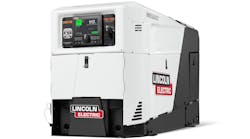As a plumbing company business owner, you understand your fleet vehicles take up a major portion of your budget. You need to know all your options and make the right choices when it comes to optimizing your fleet. Although electric vehicles are taking center stage in the media and many automotive companies have decided to decrease production of internal combustion engine (ICE) vehicles, you have more options than just hybrid and electric vehicles for your fleet.
Propane Autogas vehicles are available from original equipment manufacturers (OEMs) or via converting ICE vehicles to run on propane. There are dedicated propane Autogas vehicles and bi-fuel vehicles. Dedicated propane Autogas vehicles run only on propane, and bi-fuel vehicles can run on either propane or gasoline.
According to the US Department of Energy, bi-fuel vehicles enable the flexibility of using either gasoline or propane Autogas, which typically provides bi-fuel vehicles with a greater range than dedicated propane or gasoline vehicles. However, it is important to understand that the fuel economy of propane Autogas vehicles is slightly lower than gasoline vehicles. Yet, propane Autogas has a higher-octane rating than gasoline. Some OEMs offer optimized engines to take advantage of this higher rating, which can ultimately result in improved performance and fuel economy over non-optimized engines.
Benefits of using propane Autogas for your fleet
A clean-burning alternative fuel, Propane Autogas has been utilized for years to power light-duty, medium-duty, and heavy-duty vehicles. Owners of trade companies have found propane Autogas to be a versatile and reliable solution for their bottom lines. And if you are a business owner that has sustainability goals, propane Autogas can help you meet those goals too.
Drivetrain produces fewer chemicals: Propane powered vehicles utilize an internal combustion engine, but the combustion of propane does not produce the same amount of harmful chemicals as gasoline or diesel. Plus, they do not require the complex engine aftertreatment to meet emission standards.
Simple to fuel: Propane vehicles are fueled with a nozzle connected to a pump that transfers liquid propane from a large tank into a vehicle fuel tank. Fueling is quick – filling the tank of a propane vehicle takes the same amount of time as refilling a gasoline vehicle.
Extensive infrastructure: Transporting propane from refineries to end user locations costs less than transporting any other fuel source. Plus, propane is non-toxic and non-carcinogenic. According to OEM Off-Highway, an entry level propane fueling station for a commercial fleet application is $5,000-20,000. Propane providers may even include the price of the fueling infrastructure into the contracted price per gallon of the fuel, making the capital outlay of the infrastructure affordable.
According to the Propane Education and Research Council (PERC), there are five kinds of refueling styles which include public and private networks. To learn about these different options, associated costs, and how to get started with a propane supplier click here to download the guide.
Emissions and costs are decreased: When considering tailpipe emissions, propane offers a decrease of emissions over diesel and gasoline, without the need for aftertreatment. Also, cost savings can be large without a big investment. A gallon of propane is approximately half the cost of a gallon of gasoline or diesel. Plus, the price of a vehicle equipped with a propane fuel system is just a small increase over gasoline or diesel power options.
An alternative energy option: According to the PERC website, propane is a low-carbon fuel alternative, producing far fewer emissions than the equivalent amount of electricity generated from the US grid, and it won’t contaminate soil or groundwater. It is non-toxic and non-poisonous. Also, advancements are being made for renewable propane sourced from used cooking oil and other waste products. This enables propane to be a carbon-neutral fuel.
How to begin the conversion process
Once you decide that propane is the fuel of choice for your fleet, you then need to convert your ICE vehicles to run on propane. This may sound like a daunting task, but PERC has steps you can follow to make the conversion easy. Visit PERC’s website to learn about how to get started converting your ICE fleet vehicles to propane Autogas. Over 60% of the propane Autogas vehicles that are on the road today were converted with a certified aftermarket bi-fuel system.
With a bi-fuel conversion, drivers can switch easily between gasoline and propane Autogas. The vehicle starts on gasoline and can immediately switch to propane Autogas. Drivers who are out of range of a propane Autogas fueling station can simply switch back to gasoline to complete their route or until they locate a propane Autogas station.
Also, remember you have the option of purchasing directly from an OEM a vehicle that runs on propane Autogas. According to LPGas Magazine, Ford, General Motors, Isuzu and Lincoln manufacture Autogas vehicles. Plus, Alliance AutoGas, Campbell-Parnell, Icom North America and Roush CleanTech provide dedicated or bi-fuel propane systems on a variety of vehicles.
Candace Roulo, a graduate of Michigan State University’s College of Communication Arts and Sciences, is a technical writer covering topics in the mechanical contracting, manufacturing and supply chain industries.


